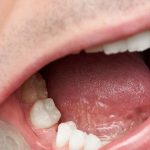The mouth is a part of the body that can be affected by various infections. These infections can occur at any age and can affect both natural teeth and gums.
If your gums are tender and painful, you may be suffering from a gum infection.
Clinique MFML’s maxillofacial surgeons give you information about gum infections, including gum infection symptoms and causes, and how to tell if you have one.
Causes of gum infection
Gum infections are often caused by poor oral hygiene. By not cleaning microorganisms and bacteria out of the mouth, poor oral hygiene promotes the accumulation of plaque, which hardens into tartar over time.
The accumulation of tartar could eventually lead to the development of a gum infection such as gingivitis or periodontitis.
You can also get a gum infection after a tooth extraction, especially if you have complications after wisdom teeth removal.
Gum infection symptoms
The main gum infection symptoms are:
- Bleeding gums
- Inflammation
- Swelling
- Increased sensitivity
- Gingival lesions or recession
- Chronic bad breath (halitosis)
- Loose teeth
- Fever or chills
Types of gum infection
Gum infections can develop as much with natural teeth as with dental implants or removable dentures.
Natural teeth
As seen above, gingivitis and periodontitis are types of infections that can develop on the gums surrounding the natural teeth.
A dental abscess coming from an untreated cavity is also likely to cause a gum infection. This is called a periodontal abscess, which appears as a purulent infection inside the tissues surrounding the periodontal pocket.
The most common gum infection symptoms on natural teeth are:
- Difficulty swallowing or drinking
- Pain in the tooth, gum or mandible
- Swelling in the cheek
- Redness
- Pus discharge
Dental implants
Dental implants are a great solution for replacing missing teeth. Both sturdy and aesthetic, dental implants also last a long time.
Even if the dental implant’s artificial root cannot become infected, the gum surrounding the dental implant can become infected. This is known as a peri-implant infection.
Gum infection symptoms with dental implants are similar to those of gingivitis. Peri-implant infection does not cause pain and spreads at a greater rate.
Properly maintain your dental implant to avoid this type of infection as much as possible.
Removable dentures
Wearing a removable denture sometimes causes gum infection. This type of infection, called denture stomatitis, usually occurs in people who constantly wear their removable dentures. It can also occur when the denture does not fit properly in the person’s mouth.
Symptoms of this gum infection are as follows:
- Redness of the gums
- Inflammation of the palatal taste buds
Who to see when you have a gum infection
Gum infections sometimes develop slowly and are not always initially painful, sometimes delaying diagnosis and management.
If you have any of the symptoms listed above, it is important to see a dentist or specialist to determine the cause and degree of infection so that appropriate treatment can be given.
Who should you see if you have a gum infection?
When gum infection from natural teeth or dentures occurs, you should see a general dentist. When the infection involves a dental implant, you should see a maxillofacial surgeon.
How to treat a gum infection
Once a gum infection is detected, treatment is required, which varies depending on the diagnosis and seriousness of the infection. The most common ways to treat gum infections are:
- Antibiotics (either in the form of tablets or injections)
- Scaling and root planing (for advanced infections)
- Gingivectomy (a treatment that removes gum tissue)
- Gum surgery (for serious cases)
Preventing gum infection
Prevention is the best tool to fight gum infections. You should follow basic dental hygiene instructions :
- Brush your teeth 2x a day using a soft bristle toothbrush and fluoride toothpaste
- Use floss or interdental brushes daily to clean the gaps between teeth
- Use mouthwash
- Get regular dental check-ups
Gum infections, you and your health
Gum infection is often caused by poor oral hygiene. However, it can also occur after tooth extraction and can occur with natural teeth, dental implants or removable dentures.
Regardless of the situation, any infection that affects the mouth must be treated immediately. You should therefore contact your dentist or maxillofacial surgeon, depending on the situation.
Remember, when it comes to oral health, prevention is always key. Use it wisely.




